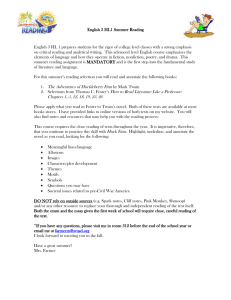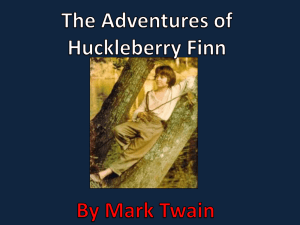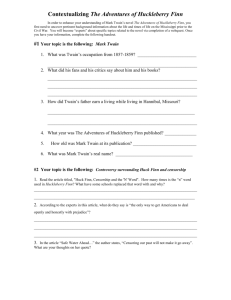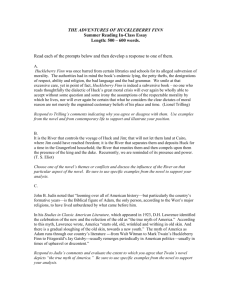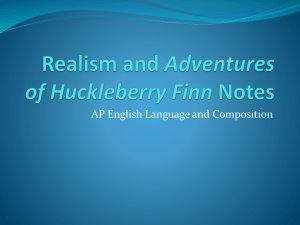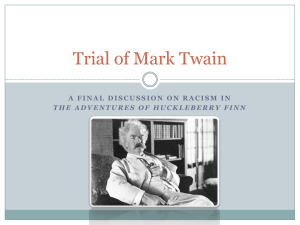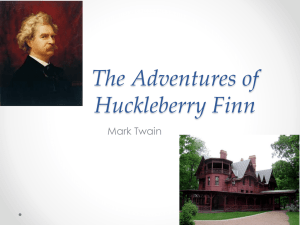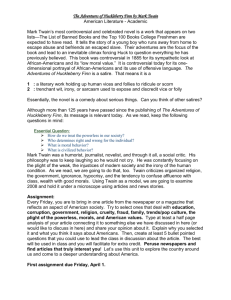Epithet in Huck Finn Stirs Protest
advertisement
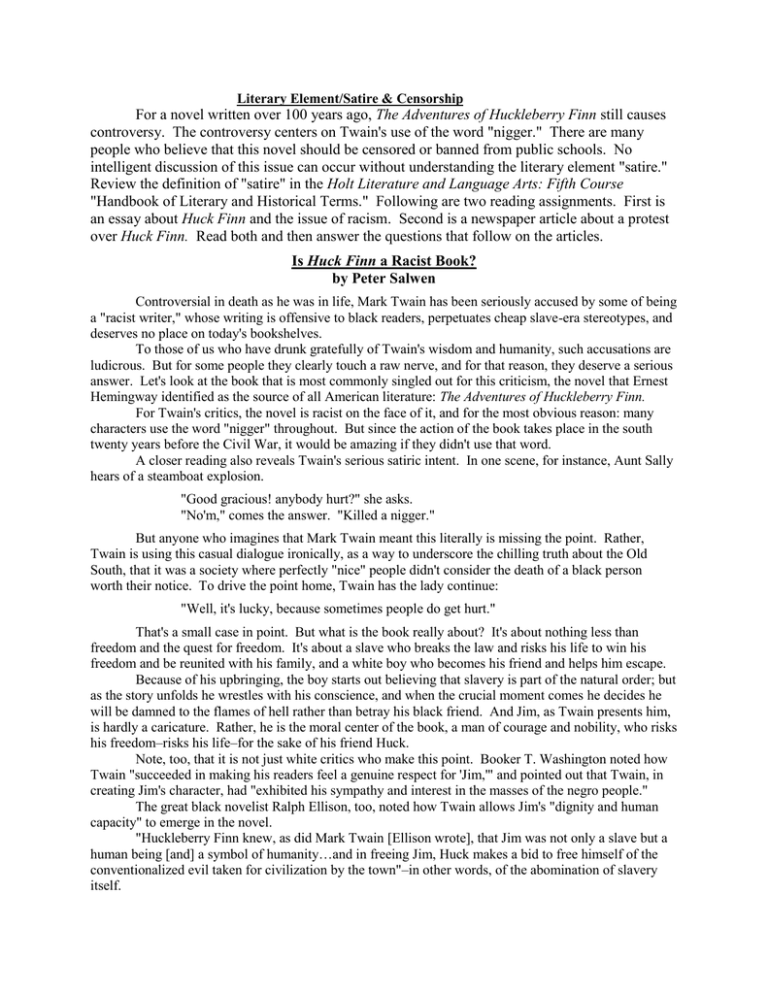
Literary Element/Satire & Censorship For a novel written over 100 years ago, The Adventures of Huckleberry Finn still causes controversy. The controversy centers on Twain's use of the word "nigger." There are many people who believe that this novel should be censored or banned from public schools. No intelligent discussion of this issue can occur without understanding the literary element "satire." Review the definition of "satire" in the Holt Literature and Language Arts: Fifth Course "Handbook of Literary and Historical Terms." Following are two reading assignments. First is an essay about Huck Finn and the issue of racism. Second is a newspaper article about a protest over Huck Finn. Read both and then answer the questions that follow on the articles. Is Huck Finn a Racist Book? by Peter Salwen Controversial in death as he was in life, Mark Twain has been seriously accused by some of being a "racist writer," whose writing is offensive to black readers, perpetuates cheap slave-era stereotypes, and deserves no place on today's bookshelves. To those of us who have drunk gratefully of Twain's wisdom and humanity, such accusations are ludicrous. But for some people they clearly touch a raw nerve, and for that reason, they deserve a serious answer. Let's look at the book that is most commonly singled out for this criticism, the novel that Ernest Hemingway identified as the source of all American literature: The Adventures of Huckleberry Finn. For Twain's critics, the novel is racist on the face of it, and for the most obvious reason: many characters use the word "nigger" throughout. But since the action of the book takes place in the south twenty years before the Civil War, it would be amazing if they didn't use that word. A closer reading also reveals Twain's serious satiric intent. In one scene, for instance, Aunt Sally hears of a steamboat explosion. "Good gracious! anybody hurt?" she asks. "No'm," comes the answer. "Killed a nigger." But anyone who imagines that Mark Twain meant this literally is missing the point. Rather, Twain is using this casual dialogue ironically, as a way to underscore the chilling truth about the Old South, that it was a society where perfectly "nice" people didn't consider the death of a black person worth their notice. To drive the point home, Twain has the lady continue: "Well, it's lucky, because sometimes people do get hurt." That's a small case in point. But what is the book really about? It's about nothing less than freedom and the quest for freedom. It's about a slave who breaks the law and risks his life to win his freedom and be reunited with his family, and a white boy who becomes his friend and helps him escape. Because of his upbringing, the boy starts out believing that slavery is part of the natural order; but as the story unfolds he wrestles with his conscience, and when the crucial moment comes he decides he will be damned to the flames of hell rather than betray his black friend. And Jim, as Twain presents him, is hardly a caricature. Rather, he is the moral center of the book, a man of courage and nobility, who risks his freedom–risks his life–for the sake of his friend Huck. Note, too, that it is not just white critics who make this point. Booker T. Washington noted how Twain "succeeded in making his readers feel a genuine respect for 'Jim,'" and pointed out that Twain, in creating Jim's character, had "exhibited his sympathy and interest in the masses of the negro people." The great black novelist Ralph Ellison, too, noted how Twain allows Jim's "dignity and human capacity" to emerge in the novel. "Huckleberry Finn knew, as did Mark Twain [Ellison wrote], that Jim was not only a slave but a human being [and] a symbol of humanity…and in freeing Jim, Huck makes a bid to free himself of the conventionalized evil taken for civilization by the town"–in other words, of the abomination of slavery itself. In fact, you can search through all of Twain's writings, not just the thirty-plus volumes of novels, stories, essays, and letters, but also his private correspondence, his posthumous autobiography and his intimate journals, and you'll be hard put to find a derogatory remark about the black race–and this at a time when crude racial stereotypes were the basic coin of popular fiction, stage comedy, and popular songs. What you find in Twain is the opposite: a lively affection and admiration for black Americans that began when he was still a boy and grew steadily through the years. In a widely praised post-Civil War sketch titled "A True Story," for example, he wrenchingly evoked the pain of an ex-slave as she recalls being separated from her young son on the auction block, and her joy at discovering him in a black regiment at war's end. And on those occasions when Twain does venture to compare blacks and whites, the comparison is not conspicuously flattering to the whites. Things like: • • • "One of my theories is that the hearts of men are about alike, all over the world, whatever their skin-complexions may be." "Nearly all black and brown skins are beautiful, but a beautiful white skin is rare." "There are many humorous things in the world; among them is the white man's notion that he is less savage than all the other savages." Mark Twain a "racist"! Isn't it about time we put this ridiculous notion to rest? Salwen, Peter. "Is Huck Finn a Racist Book?" Peter Salwen's Mark Twain Page. 1996. Salwen Business Communications. June 29, 2000. <http://www.salwen.com/mtrace.html>. ___________________________ Epithet in Huck Finn Stirs Protest District urged to take Twain book off reading list Sept. 25, 1996 by E. J. Gong, Jr. FEDERAL WAY - Shalon Bradford was excited to read The Adventures of Huckleberry Finn by Mark Twain. She'd heard it was a classic American novel. But after the first two chapters, she closed it in disgust. "It's filled with the N-word and other racist remarks," said Bradford, referring to the racial epithet for African Americans that Twain used more than 200 times in the novel. Bradford, who is African-American, said several students in her English class at Decatur High School snickered and laughed at the word. "I became really uncomfortable and sad. It's a horrible word," said Bradford, a junior. She told her aunt and legal guardian, Tamara Cobb, who is now challenging the Federal Way School District to remove the novel from its approved reading list. Cobb says the book perpetuates hate and racism, while the district contends it's an important piece of American literature that should be taught. The book describes the adventures of two runaways: Huck Finn, a 13-year-old boy, and a black slave, Jim. The book, set in the 1840s, explores racial relationships in the pre-Civil War South. Cobb angrily addressed the School Board on Monday night at its regular board meeting, saying the book would help create more Mark Fuhrmans in the world. Fuhrman is the highly publicized former Los Angeles Police detective in the O.J. Simpson murder case who used the racial epithet. "They say there's literary value, but I don't think it's OK to do it at the expense of people's feelings. It's a word that is a call-to-arms for African Americans," Cobb said. The district has begun a process to re-evaluate the book and to determine whether it should be reconsidered as appropriate for children. For now, the school has given Bradford another book to read while the class finishes Twain's novel. Cobb was asked to meet with administrators Friday to discuss the matter. "A committee of parents, teachers and administrators carefully selects the books used in the district. We don't just drop a book because one person says they don't like it. That's censorship," said Karin Stevens, a district spokeswoman. The Adventures of Huckleberry Finn has been at the center of debate nationwide for years, along with other classics such as The Catcher in the Rye by J.D. Salinger and Of Mice and Men by John Steinbeck. For the past 28 years, English teacher Dave Matthews has assigned Twain's book to his students. Matthews, who is Bradford's teacher, said he acknowledges that the book has a "raw edge" and that some of the language is offensive, but he said the positive value far outweighs the negative. "This book raises our consciousness because it shows how terrible blacks were treated back then," he said. "We need to know who we are and where we've come from. That's how society can change for the better." Most experts say Twain's book was considered a stinging commentary on the evils of racism when it was published in 1884. "This book is one of the greatest anti-racist works of fiction by an American. If you're going to show racism with all its warts, you have to use the language they would use," said Shelley Fisher Fishkin, an English professor at the University of Texas in Austin who wrote "Was Huck Black? Mark Twain and African American Voices." At the start of the book, Huck sees blacks simply as slaves but later comes to recognize Jim's humanity and suffering, Fishkin said. She suggested that teachers take extra time to put the novel into its historical context before having students read it. "This book allows us to explore the dynamics of racism and race relations," Fishkin said. "We can't afford to not teach it." But for Cobb, the racism and the racial epithets are difficult to get past. "You can never make me see how the `N-word' has any literary value in any context," she said. Gong, E. J., Jr. "Epithet in Huck Finn Stirs Protest." The Seattle Times. The Seattle Times Company. Sept. 25, 1996. The Seattle Time Company. June 29, 2000. http://seattletimes.nwsource.com/extra/browse/html/ huck_ 092596.html>. Questions 1. What is Salwen's position about Huck Finn being a racist book? 2. Name at least two ways that Salwen supports his position. 3. What change in the character of Huck does Salwen note? 4. Since Twain's purpose was to write a satire on white society, could he have done so without using the word "nigger" given the time period? 5. What is Tamara Cobb's complaint about Huck Finn? 6. Review the logical and emotional appeals in Cobbs’s argument. Does Cobb make a logical or emotional appeal when arguing to have Huck Finn removed from the school? 7. What is Fishkin's defense of the novel? 8. What is the difference between satire and just making fun of something?
